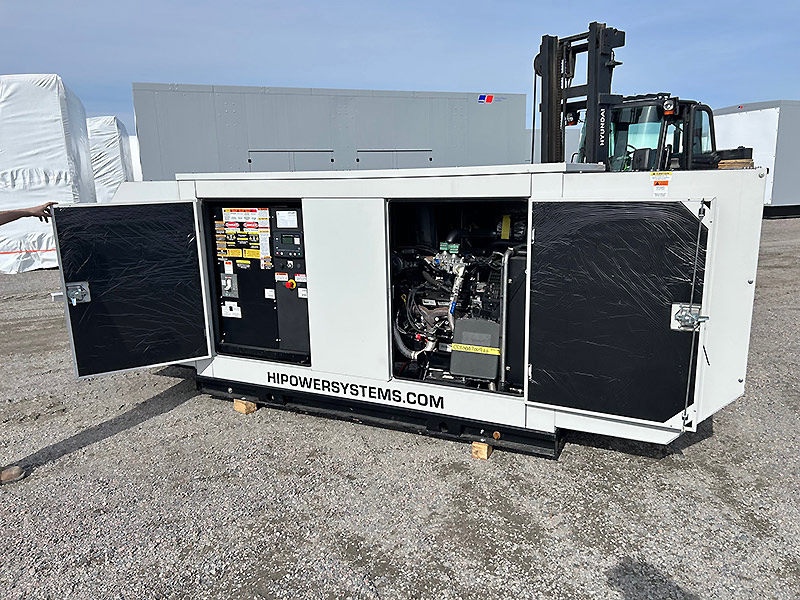
Hipower HNI 80 Natural Gas Generator
When it comes to emergency backup power, reliability and sustainability are two key concerns for businesses, healthcare facilities, data centers, and critical infrastructure providers. Diesel has long been the dominant fuel for backup generators, but natural gas generators are emerging as a strong alternative. With lower emissions, dependable fuel supply, and growing compatibility with renewable energy systems, natural gas generators offer a future-ready solution for organizations looking to safeguard operations during outages.
Lower Emissions Compared to Diesel
One of the biggest advantages of natural gas over diesel is its cleaner emissions profile. Natural gas produces less nitrogen oxides (NOx), particulate matter, and carbon dioxide than diesel fuel. This reduction in harmful pollutants is especially important in urban areas where air quality standards are strict, or in regions where businesses face tighter environmental regulations.
For companies looking to meet corporate sustainability goals, switching to natural gas can help cut greenhouse gas emissions without sacrificing reliability. As ESG (Environmental, Social, and Governance) reporting becomes more common, the ability to demonstrate cleaner backup power solutions can be a differentiator.
Reliable During Extended Outages
While diesel generators provide high power density and are widely available, they depend on on-site fuel storage or deliveries during an outage. In extended emergencies such as hurricanes, wildfires, or widespread grid failures, fuel deliveries can be disrupted, leaving diesel generators at risk of running dry.
Natural gas generators, by contrast, are typically connected to underground utility pipelines. This continuous supply ensures that even during long-duration outages, facilities can keep running without interruption. For critical operations such as hospitals, telecom providers, and data centers, this level of reliability can make the difference between maintaining essential services and experiencing costly downtime.
Additionally, natural gas infrastructure has proven to be resilient in many severe weather events, making it an increasingly attractive option for businesses that want dependable power security.
Integration with Renewables and Microgrids
Another key advantage of natural gas generators is their flexibility in integrating with renewable energy systems and microgrids. Unlike diesel generators, which are typically used in a “standby only” configuration, natural gas units can more easily serve as part of a hybrid energy system.
For example, a facility may use solar panels or wind turbines to provide energy during normal operations, while natural gas generators step in to balance loads, support peak demand, or provide backup when renewable resources are unavailable. This creates a more efficient, resilient, and lower-carbon energy system.
When combined with advanced controls and battery energy storage, natural gas generators can become an essential component of a microgrid. This can help facilities stay independent from the grid and ensure uptime even if the larger utility grid is down.
Upcoming Trends: RNG and Hydrogen Blending
The future of natural gas backup power is also evolving. Two major trends are expanding the sustainability profile of natural gas generators:
- Renewable Natural Gas (RNG): Derived from organic waste sources like landfills, wastewater treatment plants, and agricultural byproducts, RNG is pipeline-quality gas that can be used interchangeably with conventional natural gas. By capturing and repurposing methane that would otherwise be released into the atmosphere, RNG significantly reduces lifecycle greenhouse gas emissions.
- Hydrogen Blending: Utility providers and equipment manufacturers are actively exploring hydrogen blending into natural gas pipelines, typically at levels of 5–10%. Hydrogen is a carbon-free fuel, and blending it with natural gas can further reduce emissions. In the near future, natural gas generators may be able to operate on these hydrogen-enriched blends, making them even cleaner and more aligned with long-term decarbonization goals.
These innovations mean that natural gas generators are not just a transitional technology, but a platform that can evolve with the changing energy landscape.
Partnering with Experts for Reliable Backup Solutions
Selecting the right emergency power system is a critical decision that requires balancing performance, compliance, and long-term sustainability. Global Power Supply has deep expertise in backup and emergency power projects, including natural gas, diesel, UPS systems, and battery energy storage. Our team works with clients across industries to design, deliver, and maintain systems that meet their specific reliability and regulatory requirements.
If you’re considering natural gas generators as part of your energy resilience strategy, we can help you navigate the options, integrate with renewable technologies, and prepare for upcoming trends like RNG and hydrogen blending.
Contact Global Power Supply today to discuss how natural gas generators can provide your organization with reliable, cleaner, and future-ready backup power.